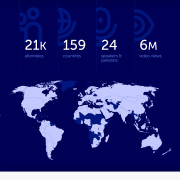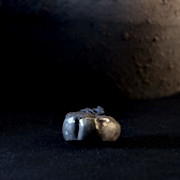- Science News
- Young Minds
- Working with Nobel Prize winners – What’s it like?
Working with Nobel Prize winners – What’s it like?

By Noa Segev, FYM Project Coordinator
If you had the chance to meet a Nobel Laureate, what would you ask them?
This is exactly the question that occupied my mind three years ago, before my first interview with Professor Dan Shechtman, who won the Nobel Prize in Chemistry 2011. Working with the Frontiers for Young Minds team, I was coordinating an article which would eventually be published as our Nobel Collection, and this was the first step.
Join me for a quick insight into this fascinating work which accompanies this unique article collection (now featured in the Washington Post).

What makes Nobel Prize winners successful?
In his studies, Prof Shechtman analysed the structure of solid materials and discovered a new type of material. This material was somewhat similar to a crystal (that is, a highly-ordered solid such as ice or table salt), but also had properties that had never been seen before. Prof Shechtman called this new substance a ’quasicrystal’. For a long time, he was ridiculed for this discovery by some of the most renowned scientists in the world, including Nobel Laureates. These scientists did not acknowledge the existence of quasicrystals as it contradicted the well-established classical definition of a crystal. Despite the difficulty of standing against scientific giants, Prof Shechtman held on to his truth until he finally received his well-deserved recognition in 2011. This story shows that being a successful scientist requires a complex combination of attributes, including passion, knowledge, skill, and persistence.
What is most important to a Nobel Laureate?
Towards the end of our interview, Prof Shechtman said he is often asked what is the happiest moment of his life. You might assume this would be winning the Nobel Prize, but the answer was rather different: his happiest moments are the births of his children and grandchildren. This was a surprise because I saw the Nobel Prize as the peak of a scientist’s life. Prof Shechtman’s perspective taught me an important lesson about how life is bigger than even the most glorious professional achievements.

Are Nobel Prize winners just like us?
After this first interview, I was lucky enough to interview many more Nobel Laureates in different fields: chemistry, physics, physiology, medicine, and economics. What struck me most is that these people are not only exceptional scientists and great minds, but also kind human beings who generously and openly shared their personal stories, failures and success, and insights for the benefit of young scientists-to-be.
Despite their great success, and busy schedules, these Nobel Laureates were happy to have a conversation about their personal and professional struggles, and the strategies they developed to deal with them. I found their life stories very relatable and highly relevant for everyone who wants to be successful in their career – whether in science or not. Read their articles for tips from each of them about building your future!
What do Nobelists say about Frontiers for Young Minds?
The Laureates we worked with are very supportive of Frontiers for Young Minds' work to present their research in an accessible way to young readers worldwide. Their interest and pride in taking part shows their passion for the importance of sharing scientific knowledge with the public, and making it engaging for everyone.

Next steps for the Nobelists
We’ve had an amazing experience with the 10 Nobel Prize winners featured in the first volume of our Nobel collection (you can download the eBook here) – including a recent launch of the collection articles in Hebrew, at a live event in Israel featuring a talk from Prof. Aaron Ciechanover (Nobel Prize in Chemistry, 2004).
We are moreover proud to announce the newly launched Volume 2 of this amazing initiative tomorrow! With many more articles already moving towards publication, we are continuing to develop this fascinating and exciting collaboration with Nobel Prize winners. Stay tuned.

Prof. Aaron Ciechanover speaking at the Hebrew Collection event, with young participants and sponsors







